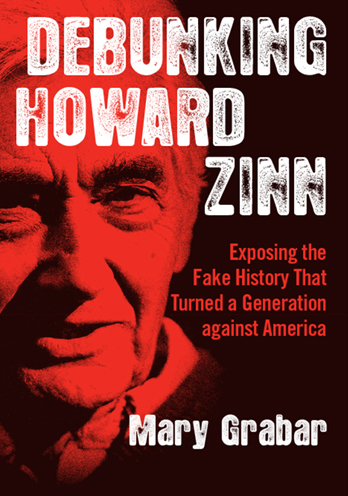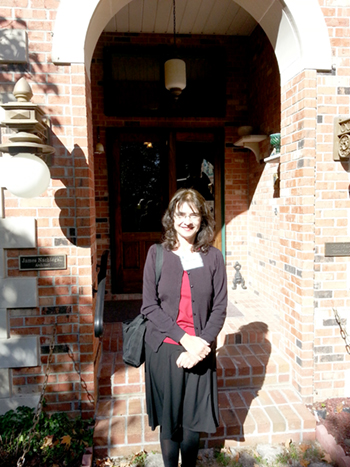Posted April 27, 2015, by Mary Grabar. News from the Alexander Hamilton Institute, as spring makes its way slowly up North. . .
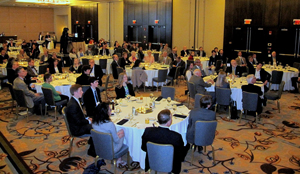 A record-breaking 140 students, scholars, board members, and community members attended the opening night banquet and keynote address of the Alexander Hamilton Institute’s Eighth Annual Carl B. Menges Colloquium, held at Turning Stone Resort, in Verona, New York, April 16 to 18. Michael Munger, Professor of Political Science and Director of the Philosophy, Politics, and Economics Program at Duke University delivered the keynote address: “The Entrepreneurial Virtues.” On April 17 and 18, fifteen panelists from areas as diverse as history, law, finance, economics, and philanthropy discussed in six sessions “Entrepreneurship, Innovation, and the Rule of Law: How to Return America to Prosperity.” Sessions included “Property Rights, Uncertainty, and Freedom,” “Taxation and Entitlements,” and “Rule of Law and Regulation.” AHI President Richard Erlanger, an entrepreneur himself, opened the colloquium by speaking to the urgency of the topic given the alarming decline in overall entrepreneurial activity in the United States over the last several years.
A record-breaking 140 students, scholars, board members, and community members attended the opening night banquet and keynote address of the Alexander Hamilton Institute’s Eighth Annual Carl B. Menges Colloquium, held at Turning Stone Resort, in Verona, New York, April 16 to 18. Michael Munger, Professor of Political Science and Director of the Philosophy, Politics, and Economics Program at Duke University delivered the keynote address: “The Entrepreneurial Virtues.” On April 17 and 18, fifteen panelists from areas as diverse as history, law, finance, economics, and philanthropy discussed in six sessions “Entrepreneurship, Innovation, and the Rule of Law: How to Return America to Prosperity.” Sessions included “Property Rights, Uncertainty, and Freedom,” “Taxation and Entitlements,” and “Rule of Law and Regulation.” AHI President Richard Erlanger, an entrepreneur himself, opened the colloquium by speaking to the urgency of the topic given the alarming decline in overall entrepreneurial activity in the United States over the last several years.
The diverse viewpoints of panelists--ranging from advocates for federal assistance in entrepreneurship to libertarians and strict Constitutionalists--underscored the principles that animate the AHI charter, which were referenced by charter fellow Douglas Ambrose in his reflections on the history of the AHI since its inception in 2007. The AHI, said Ambrose, was dedicated to the promotion of intellectual diversity and the idea that “the reasoned study of Western civilization, its distinctive achievements as well as its distinctive failures, will further the search for truth and provide the ethical basis necessary for civilized life.”
In his address, Ambrose fondly recalled the influence of mentor and friend, the late Eugene Genovese, called by Benjamin Schwarz in a 2005 article in The Atlantic “this country’s greatest living historian,” and a Marxist for the first 40 or so years of his academic career. In his will Genovese bequeathed his southern history collection and personal papers to the AHI. Genovese, said Ambrose, taught his students “about how we must be true to the standards of professional scholarship and intellectual honesty” regardless of our political affiliations.
Citing Genovese’s essay, “On Being a Socialist and a Historian,” Ambrose recounted, “In the late ‘60s, at the height of demands that colleges become vehicles for radical social change—with corresponding demands for the politicization of courses, curricula, and scholarship so that they could contribute to the struggle for justice—Genovese insisted that we defend the academy from such corruption, that we recognize and respect the intrinsic value of intellectual inquiry that seeks truth regardless of its political utility.”
AHI continues to advance this vision. As Ambrose stated, “In our eight years we have sought to help students recognize that smart, thoughtful, sophisticated persons exist throughout the political spectrum, that only by confronting, engaging, and understanding those persons can a student formulate his or her own perspective, and thereby appreciate the process by which genuine knowledge and wisdom is produced.” Accordingly, “Only those sincere efforts to discover the truth, rather than promote our political agenda, will make us worthy of the respect and emulation of our most important constituency: our students.”
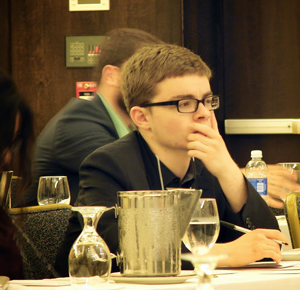 That spirit was evidenced in the questions posed by students attending the colloquium, students not only from the local schools, Hamilton College and New Hartford High School, but also from universities in Rochester, such as the Rochester Institute of Technology (home of the AHI affiliate, The Center for Statesmanship, Law, and Liberty) and the University of Rochester, as well as from Colgate University and Skidmore College. Students and the community members who often attend continuing education courses at AHI were invited to all the panels, as well as to most meals and receptions, where they continued discussions with panelists and other attendees.
That spirit was evidenced in the questions posed by students attending the colloquium, students not only from the local schools, Hamilton College and New Hartford High School, but also from universities in Rochester, such as the Rochester Institute of Technology (home of the AHI affiliate, The Center for Statesmanship, Law, and Liberty) and the University of Rochester, as well as from Colgate University and Skidmore College. Students and the community members who often attend continuing education courses at AHI were invited to all the panels, as well as to most meals and receptions, where they continued discussions with panelists and other attendees.
The opening night dinner and reception traditionally offers the opportunity to recognize graduating AHI undergraduate fellows. This year, Sarah Larson and Joe Simonson spoke about how AHI offered moral, intellectual, and practical support as they matured during their four years at Hamilton College. Both touched on the challenges facing students who dedicate themselves to the open-minded pursuit of truth. Larson focused on the incremental process of “becoming” a more mature and independent individual, even in the face of pressures to conform by peers and professors. Simonson recalled the fight against censorship on campus through his editorship of the AHI-sponsored campus newspaper, Enquiry, and experience during a summer journalism internship. Other Hamilton students in the audience were introduced as well and given credit for their dedication to the pursuit of knowledge, evidenced in their participation in sometimes multiple AHI reading groups, lectures, and directed readings—on top of full academic schedules.
Munger’s keynote address drew on Aristotle and Cicero to claim that the profit motive can be consistent with virtue. He used an example from the experience of an American economist and soldier in a German P.O.W. camp during World War II who set up an exchange in rations with other P.O.W.’s to illustrate the point, “So long as the entrepreneur creates value in every exchange, . . . his actions are consistent with virtue.” Eliciting frequent laughter from the audience, Munger also contrasted the entrepreneurial spirit expressed in a short story by Somerset Maugham with its opposite, “rent-seeking,” in a William Faulkner short story.
Readings at the panel discussions ranged from such foundational and philosophical writers as Alexis de Tocqueville, F.A. Hayek, and Joseph Schumpeter, to such contemporary thinkers as George P. Schultz, Jeff Bezos, and N. Gregory Mankiw. Readings came from classical works, ranging from Democracy in America to The Managerial Revolution, as well as current publications such as the Daily Beast, Foreign Affairs, and Journal of Economic Perspectives.
The first panel, “Dangers Portended,” kicked off with a discussion of Alexis de Tocqueville’s warnings from 1831 about a growing bureaucracy. In Democracy in America, he noticed that citizens, falling under the control of the public administration, are “brought insensibly and almost without their knowing it to sacrifice new parts of their individual independence to it every day.” The same men who “overturn a throne and ride roughshod over kings bend more and more without resistance to the slightest will of a clerk.” As checks to such centralized power were local associations, which grow out of community and shared cultural values. Challenges recounted by panelists included New Deal policies, overspecialization in education, condo association rules, unions, and the decline in voluntary associations, such as women’s clubs and literary groups. Some panelists called for more government action, such as in breaking up banks after they reach a certain “threshold” (as happened in 2008). Others called for a repeal of the National Labor Relations Act. Questions from students ranged from those about human trafficking to “super corporations.”
The second session of the morning, “Rule of Law and Regulation,” took as the starting point the importance of the rule of law to entrepreneurship. Opposed to the rule of law is the “whim” of a sultan, king, or other monarch--and today of the bureaucrat. The negative impact of corporate lobbyists was recalled as was the political opportunism that emerged from the election of district attorneys, beginning under Andrew Jackson’s administration (leading to prosecution of high-profile cases, such as Martha Stewart’s). The session ended with a call to teach economics and journalism in secondary school.
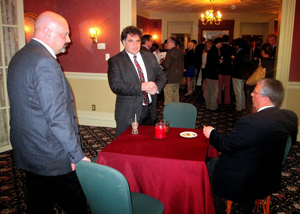 The afternoon session, “Entrepreneurship and Innovation,” addressed the question of who are our entrepreneurs after the managerial revolution, and can entrepreneurship be taught, for instance in an Entrepreneurship 101 course? One panelist, pointing to land-grant universities, maintained that public-private partnerships can encourage entrepreneurship. Others recalled the abuses of the Solyndra case and the absence of Constitutional justification for funding entrepreneurship.
The afternoon session, “Entrepreneurship and Innovation,” addressed the question of who are our entrepreneurs after the managerial revolution, and can entrepreneurship be taught, for instance in an Entrepreneurship 101 course? One panelist, pointing to land-grant universities, maintained that public-private partnerships can encourage entrepreneurship. Others recalled the abuses of the Solyndra case and the absence of Constitutional justification for funding entrepreneurship.
Panelists at the Saturday morning session, “Property Rights, Uncertainty, and Freedom,” recalled medieval canon law, English enclosure laws, and Marx’s concept of the “original sin” of profligate ancestors. The conversation expanded to challenges from newly independent countries in the 1960s to the assaults on private property since 1900. The importance of opportunity in keeping the poor from wanting to take property, the reverse confiscatory policies of eminent domain, the need for self-appointed fiduciaries to carry out the will of the collective, and a suggestion to return to common law with juries to adjudicate environmental issues marked a lively session.
The second morning session, “Taxation and Entitlements,” considered whether transfer payments and affirmative action were a violation of property rights, whether the Constitutional changes of the 1830s and 1840s relegated state governments to the position of rent-seekers, the “utility” of welfare, and the need to “tip the scales” with affirmative action because of “endemic and systemic” racism.
The final session, “Whither America and the World,” focused on two glimpses into the future: the final chapter of The Fourth Great Awakening and the Future of Egalitarianism (2002), the last major work of the Nobel Prize-winning economist Robert William Fogel, who called for a new spiritual awakening of “self-realization,” and Jim Manzi’s “The New American System,” in National Affairs, an exploration of how to refire “the engine of innovation and prosperity” in the United States.
Appropriately, an animating theme of all the panels was resounded at the end, as Professor Ambrose’s call to resist despair and find hope in education was repeated by panelists.
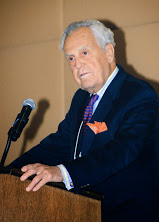 Judging by the turn-out and response, the results of the colloquium, resonated broadly and deeply. Carl B. Menges, the proud product of a traditional liberal arts education and driving force in the creation of the independent AHI after failing to establish an Alexander Hamilton Center at his alma mater Hamilton College, should be congratulated for his inspiring efforts at educational reform.
Judging by the turn-out and response, the results of the colloquium, resonated broadly and deeply. Carl B. Menges, the proud product of a traditional liberal arts education and driving force in the creation of the independent AHI after failing to establish an Alexander Hamilton Center at his alma mater Hamilton College, should be congratulated for his inspiring efforts at educational reform.


